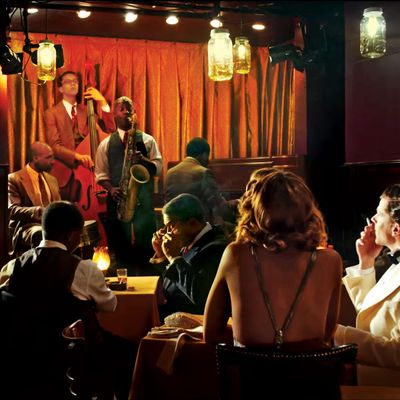
Woody Allen’s ’30s romantic drama Café Society is a surprisingly graceful work. It’s a young man’s tale of woe rendered with an old man’s aversion to dawdling over what can’t be helped, over questions of human nature that have long been settled to everyone’s dissatisfaction. The worldview is weary, and Allen narrates in a voice that, for the first time, suggests his 80 years of age. But his touch lightens with each film, and the melancholy bubbles up from below and catches you off guard.
The movie centers on a love triangle, though the sweet, dim protagonist, a boychik from the Bronx named Bobby Dorfman (Jesse Eisenberg), doesn’t register that triangle’s existence until too late. He comes to Hollywood hoping for a job with his uncle Phil Stern (Steve Carell), an ostentatiously rich agent with big-deal clients who still feels compelled to let everyone in earshot know who they are. After making Bobby wait for a few days, Phil awkwardly offers him work as an assistant, directing another assistant, Vonnie (Kristen Stewart), to show the kid around town. Bobby is straightaway sick with love, and Vonnie responds to his sweetness and idealism. But she has a boyfriend, someone older and worldlier. Three guesses.
Eisenberg stopped playing this sort of jabbering innocent several years ago, before The Social Network, but he still has access to the part of himself that gravitates toward foolishness, as if he’s determined to expose his own weaknesses. He gets a good rhythm going — relaxed but jaunty — with Stewart. They worked together in the tepid but pleasant action comedy American Ultra, and they complement each other. She’s sharp and peppy in form-hugging outfits while everything he wears hangs off him, as if his clothes can’t determine his shape. (Maybe because he has no shape — he’s unformed.) His guilelessness slips past her defenses. But when he babbles about moving to Greenwich Village and living in a garret among bohemians, her face freezes.
Does Allen fill Vonnie in or is she one more of his mysterious female others? No, he doesn’t; but no, she isn’t. Stewart is alive onscreen. Her Vonnie feels all there, even if we don’t have a full picture of what’s inside. Allen is capable of writing good female protagonists, but he’s still one of those artists who, on some level, have never gotten over not getting The Girl — a hoped-for means for a Jewish man to attain self-respect or wholeness, especially when she’s a non-Jew like Vonnie. But at least Allen doesn’t hate The Girl for rejecting his alter ego. She’s adrift, too. And a man like Phil could anchor her for life.
As Phil, Carell takes getting used to. He stepped in for Bruce Willis, who dropped out during shooting. He gives a fine performance, but he’s closed off, inward. He doesn’t have the leading-man ease that would make him sexy to someone like Vonnie. If that sounds unfair — plenty of young women in Hollywood marry aged gnomes and even believe they’re in love — then so be it. Maybe it’s simply that he and Stewart don’t have chemistry.
Carell does suggest Jewishness, which Willis probably wouldn’t have, and Jewish insecurity is central to Café Society. It’s in how Phil flaunts his client list. And it’s the key to understanding Bobby’s psychotic brother, Ben (Corey Stoll), a gangster who regularly — it’s a running gag — murders rivals or just people he doesn’t like and buries them under freshly poured concrete. Ben can’t stand the thought of being powerless like his working-class parents. He gives money to his mom (Jeannie Berlin), who makes noises about rejecting it on moral grounds but finally accepts her son’s assurances that it’s all on the up and up — even though she knows it’s not. It’s Ben who makes Bobby a manager at the posh nightclub that gives the movie its title and who puts Bobby for the first time at what seems like the center of the universe. There, Bobby finds another non-Jew with whom to mate: a blonde socialite (Blake Lively, in a perfectly nuanced performance) who’s neither shallow nor deep but simply in another realm. She’s highly presentable, and she won’t break his heart.
Café Society has nice marginalia. There’s a gem of a scene with a fledgling Hollywood prostitute (Anna Camp) who turns out to be Jewish, too. When Bobby hears he’s her first, he tries to beg off, which makes her determined to go through with it, which makes him angrily say fine, which makes her recoil — a switchback psychodrama that’s funnier the longer it goes on. And Allen provides another Jewish archetype in Bobby’s brother-in-law, a mild-mannered moral philosopher who has no dramatic weight — zero. He’s just not a factor in the material world of Bobby and his gangster brother.
Given that Allen doesn’t vary his techniques, it’s surprising to see something new in Café Society: luscious color by the great Italian cinematographer Vittorio Storaro. Even the sepia glows, like a golden egg, Southern California style. For a long time, Allen had been wedded to long takes with no tricky angles, but here he uses an occasional close-up to intensify the emotion. It’s an unusually warm world, full of helpful wealthy people and friendly faces. That’s the conundrum. It’s too shallow to nourish the spirit of a man like Bobby. But it’s too rich to leave.
*This article appears in the July 11, 2016 issue of New York Magazine.


